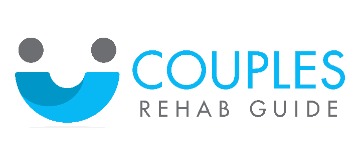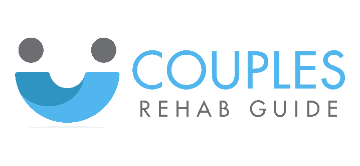SAME SEX COUPLES REHAB CENTERS:
EVERYTHING YOU NEED, TO FIND
A REHAB THAT ACCEPTS GAY COUPLES
Rehabs For Same Sex Couples: Addiction Treatment In LGBTQ Relationships
When it comes to addiction and substance abuse, LGBTQ individuals face unique challenges. According to National Survey on Drug Use and Health (NSDUH), members of the LGBTQ community are more likely than their heterosexual and cisgender counterparts to abuse substances. The reason for substance use differences in the LGBTQ community is often because members of the this community experience higher levels of stress and trauma, which can lead to self-medicating with drugs or alcohol.
While many rehab facilities claim to be LGBTQ-friendly, not all of them are created equal. This is why it’s so important for same-sex couples to do their research before choosing a rehab facility. This article will provide an overview of some things same-sex couples should look for in an addiction rehab facility, particularly when they are looking for a facility to attend with their partner. If you need help choosing a facility for you and your partner, contact one of our advocates today.
Same Sex Rehab For Couples
What is a Couples Rehab?
Couples rehab specifically focuses on helping couples struggling with substance abuse issues. This type of rehab can be done in an inpatient or outpatient setting, depending on the severity of the addiction and the couple’s needs.
Couples rehab typically includes both individual and group therapy sessions. In individual therapy, each partner will work with a therapist to address their personal issues with addiction. In group therapy, couples will participate in sessions together to learn more about communication and conflict resolution skills.
One of the main goals of couples rehab is to help couples rebuild their relationship and establish healthy boundaries. This type of rehab can be particularly beneficial for couples who have experienced trauma or betrayal due to addiction. If you and your partner are struggling with addiction, couples rehab may be a good option for you.

Substance Abuse and Mental Health in The LGBTQ Community
The LGBTQ community has long been underserved and misunderstood by the mental health and addiction treatment communities. Research shows that individuals in the LGBTQ+ community are significantly more likely to have thoughts about suicide and attempt suicide more often than the rest of the population. One study concluded that 17 percent of LGBTQ+ adults have attempted suicide during their lifetime compared to 2.4 percent of the general US population, while transgender individuals attempt suicide at almost nine times the rate of the general population.
These alarming statistics point to a much larger problem: the LGBTQ community is not getting the help they need regarding mental health and addiction. One of the main reasons for this is that many doctors and therapists are not trained to deal properly with LGBTQ patients. This can leave members of the LGBTQ community feeling isolated and stigmatized, leading to further mental health issues.
Members of the LGBTQ community often have a hard time finding addiction treatment that is tailored to their needs. For example, many rehab facilities do not have experience dealing with transgender patients or those who don’t identify as heterosexual. As a result, these individuals often have to go through treatment without proper support from those who understand them and the issues they face daily.
Several other factors contribute to the higher rates of mental health disorders and substance abuse in the LGBTQ community. One is the stress that comes from living in a society that does not always accept one’s sexual orientation or gender identity. This stress can be compounded by discrimination, violence, and exclusion from social and family networks. One study found that half of bisexual women and transgender people will experience sexual violence at some point in their life. This trauma can lead to mental health problems like anxiety and depression, which in turn can lead to substance abuse as a way of self-medicating.
The lack of understanding and support from mental health and addiction professionals takes a toll on LGBTQ individuals struggling with these issues.
What is an LGBTQ-Friendly Rehab?
An LGBTQ+ rehab is a rehabilitation facility that is inclusive of people who identify as lesbian, gay, bisexual, transgender, queer, and/or any other non-heterosexual orientation or gender identity. This type of rehab center embraces the diversity of the LGBTQ+ community and provides a safe and welcoming space for everyone.
An LGBTQ+ friendly rehab center will have staff trained in sensitivity to the needs of this community. The rehabilitation program will also be designed with the specific challenges that people who identify as LGBTQ+ face when struggling with addiction. For example, many have faced discrimination and trauma in their lives, which may need to be addressed for healing to occur.
Another form of enabling that can occur in these relationships is codependency. This is when one or both partners become so focused on the other’s addiction that they neglect their own needs. They may put their partner’s drug use and needs ahead of their own job, family, and friends.
Private Rehab For Couples
What to Expect In an LGBTQ Rehab
When people are struggling with addiction, they often wonder what level of care they need. It’s essential to understand that there is no one-size-fits-all answer to this question. The level of care that is right for you will depend on several factors, including the severity of your addiction, your medical history, your mental health, and your personal circumstances.
In general, there are four primary levels of care: detox, inpatient, outpatient, and aftercare. Here’s a brief overview of each level of care:
Detox: Detoxification is the first step in addiction treatment. During detox, your body will rid itself of all traces of drugs and alcohol. This process can be uncomfortable, which is why it’s important to detox under the supervision of a medical professional. They can help make the process much more comfortable.
Inpatient: Inpatient treatment is a higher level of care than detox. In an inpatient setting, you will live at the treatment facility and receive 24-hour care from medical professionals. This level of care is best suited for people with a severe addiction or those who have relapsed after previous attempts at treatment.
Aftercare: Aftercare should always be set up before you leave inpatient treatment to ensure you have a plan to stay sober once you’re home. Aftercare generally includes individual therapy, group therapy, and support groups like Alcoholics Anonymous or Narcotics Anonymous. The goal of aftercare is to help you transition back into your everyday life and prevent relapse.
In some cases, it includes sober living. Sober living communities provide a supportive environment for those in recovery. Couples can live together in sober living homes and attend weekly meetings and activities together. This program can be particularly helpful for couples committed to maintaining sobriety and rebuilding their relationship.
Outpatient: Outpatient treatment is less intensive than inpatient treatment but still requires a significant commitment. During outpatient treatment, you will typically meet with a therapist or counselor several times per week. You will also be expected to attend group meetings and participate in other recovery-related activities.
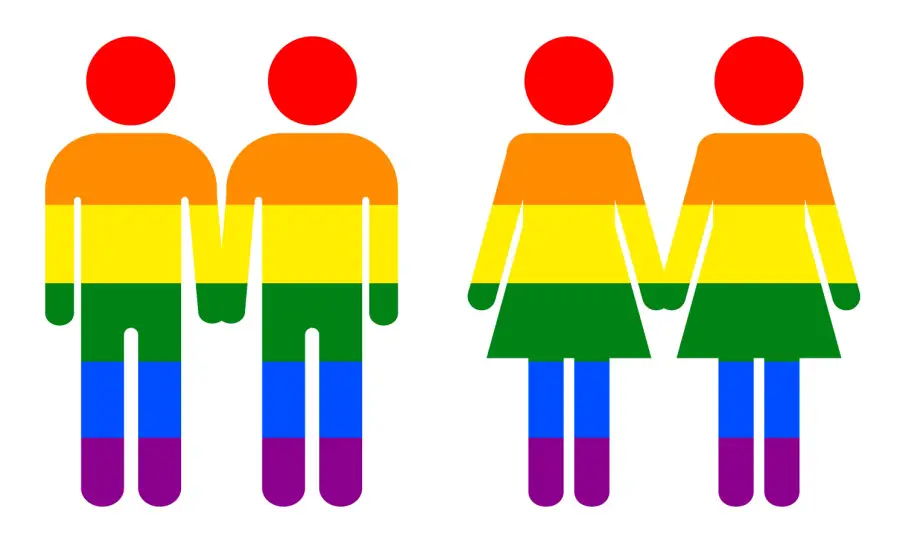
Types of Treatment and Specializations in Same-Sex Rehabs
When looking for help with addiction, it is vital to find a facility with doctors, therapists, and counselors who specialize in treating LGBTQ patients. Here are some specializations that doctors and therapists may have in helping LGBTQ patients:
Gender-Affirming Care: This care is important for transgender and gender non-conforming people struggling with addiction. It can help affirm their gender identity and make them feel more comfortable in treatment.
Gender and Sexuality: It is crucial for the staff at the facility you choose to understand the complex interplay between gender, sexuality, and culture when working with LGBTQ patients. This includes knowledge of the coming out process and the unique stressors that members of the LGBTQ community face.
LGBTQ-Specific Substance Abuse Treatment: Addictions can take many forms, including substance abuse, gambling, sex, and overeating. LGBTQ-affirming therapists will be familiar with the unique obstacles that members of the community face when trying to overcome an addiction. Treatment should be designed specifically to address issues such as discrimination, violence, and exclusion.
Same-Sex Couples Therapy: Couples therapy can be an effective way to work through relationship issues. It can be especially helpful for LGBTQ couples who may not have access to other resources, such as family support or religious guidance. LGBTQ-affirming therapists will be familiar with the unique challenges that same-sex couples face and can provide guidance on how to navigate these challenges.
Couples Behavioral Health Therapy: Behavioral health therapy is integral to alcohol and drug rehab for gay couples. This therapy can help patients understand and change the behaviors that contribute to their addiction. It can also help them develop coping mechanisms for dealing with stress and triggers.
One-On-One Therapy: One-on-one therapy can help you identify the root causes of your addiction. It’s not uncommon to turn to substances to cope with underlying issues such as anxiety, depression, or trauma. By addressing these issues in therapy, you can start to heal the wounds that led you to addiction in the first place. You can also learn how to develop healthy coping mechanisms for dealing with stressful situations and triggers.
Group Therapy: As anyone who has been through addiction recovery will tell you, it is not a journey you can make alone. In fact, one of the most important things you can do during addiction recovery is to surround yourself with a supportive community of friends, family, and other loved ones. However, for many LGBTQ individuals, finding this kind of support can be difficult. This is where group therapy comes in.
LGBTQ Marriage Therapy: LGBTQ marriage therapy works to address the unique challenges that LGBTQ couples may face in their relationships. These challenges can include discrimination, family rejection, and social stigma. It’s also necessary to address issues within the marriage, such as poor communication, infidelity, or financial stress.
Family Therapy: Family therapy can be an invaluable resource for both those struggling with substance use and their families during treatment. It can help families of those with substance use issues learn to communicate more effectively by providing them with the tools and resources they need. In addition, the therapist can act as a sounding board, helping families to understand each other’s perspectives.
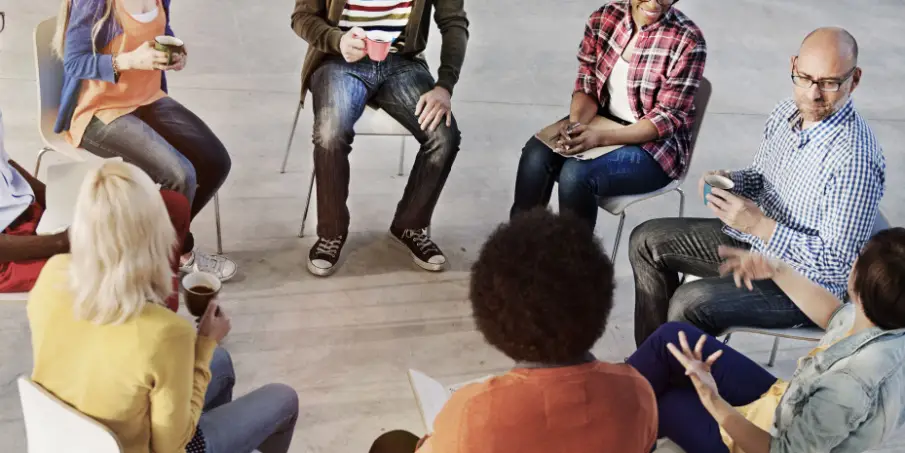
Gay Rehab Centers
Many different types of LGBTQ rehabs are available for men in same-sex relationships. One option is gender-specific and LGBTQ-focused, meaning it focuses exclusively on helping men in the LGBTQ community overcome addiction. These programs often incorporate traditional 12-step principles into their treatment plans, but they also recognize that the unique experiences of being a man in a same-sex relationship can contribute to addiction. As a result, they strongly emphasize helping men develop healthy coping mechanisms for dealing with stress, anxiety, and other negative emotions. Because of the discrimination and violence they often face, it is essential to have a space where men can feel secure and accepted.
Lesbian-Friendly Rehabs
There are many things you can expect from a lesbian-friendly rehab center. These facilities provide a safe and inclusive environment. You should feel comfortable and accepted from the moment you walk through the door. The staff will be LGBTQ+ friendly and trained in cultural competency, and will recognize and validate your lesbian relationship, offer treatment specific to the needs of LGBTQ+ individuals, and provide an individualized and comprehensive treatment plan to address your addiction, mental health, and relationship issues.

Who Goes to Couples Rehab?
Couples rehab is designed to help couples struggling with addiction and other mental health issues. The program provides a safe and supportive environment for couples to work through their problems and learn new skills for coping with stress and triggers. A gay-friendly couples rehab can be an effective treatment option for many, gay, lesbian, and transgender couples.
Addiction can take a toll on all aspects of a relationship, including communication, trust, and intimacy. Couples struggling with addiction may find that traditional treatment methods, such as individual therapy or 12-step programs, are not enough to help them beat their addiction and maintain their relationship. If that’s the case, couples rehab is a great option. It offers a more structured and intensive approach tailored to couples’ needs.
Benefits of Attending a Gay-Friendly Rehab Center
As someone in the LGBTQ community, you have likely already faced many challenges in your life. Finding the right rehab center is yet another challenge you may have to face when struggling with addiction. Finding a rehab center that understands the unique challenges you are facing and has experience treating members of the LGBTQ community is crucial. Here are a few reasons why attending a gay-friendly rehab center is so important.
Safety and Inclusivity
An LGBTQ-specific rehab center is a safe space to recover from addiction. At these facilities, you will be surrounded by people who understand being a member of the LGBTQ community. You will not have to worry about being judged or misunderstood; instead, you will be accepted for who you are.
Start Healing Together Now!
Improved Treatment Outcomes
Studies have shown that treatment outcomes are improved when patients receive care in an environment that is inclusive of their identity. This is especially true for members of marginalized communities, such as the LGBTQ community. When you attend an LGBTQ-specific rehab, you can expect to receive culturally competent care designed to meet your specific needs. This type of care has been shown to lead to better treatment outcomes.
Stronger Connection to the Community
One of the most important parts of recovery is feeling connected to a community. An LGBTQ-specific rehab center can provide you with that sense of connection. These facilities offer programs and support groups specifically for LGBTQ+ people in recovery. This allows you to build meaningful relationships with others who understand what you are going through. These relationships can provide much-needed support during difficult times.
Access to Expert Care
Another significant benefit of opting for LGBTQ-specific rehab is that you’ll have access to expert care from healthcare professionals who understand the specific needs of the LGBTQ community. Many traditional rehab programs simply aren’t educated on the LGBTQ community and how to help.
How Long Does Couples Rehab Last?
Couples rehab typically lasts 30-45 days but, in some cases, can extend up to 90 days. Treatment involves both individual and group therapy sessions. During individual therapy sessions, each partner will work with a therapist to address their unique needs. Group therapy sessions provide a forum for couples to share their experiences and learn from each other. In addition to therapy, couples rehab programs may also include educational workshops, skills training groups, and family counseling sessions.
Ultimately, the length of time in rehab varies from individual-based the following:
History of Substance Use: The first factor that will be considered when determining how long you should stay in rehab is your history of substance use. If you have been using drugs or alcohol for a long time, you may need to stay in rehab for longer to give your body and mind time to adjust.
The volume of Use: Another factor that will be considered is the volume and frequency of your substance use. If you have been using large amounts of drugs or alcohol and/or have been using regularly, you may need to stay in rehab for a more extended period to detox and recover.
Dual Diagnosis: A dual diagnosis is when someone suffers from both a substance abuse disorder and a mental health disorder. Both conditions can interact with and worsen each other, so it’s essential to seek treatment for both simultaneously. If you have a dual diagnosis, you may need to stay in rehab for a longer period of time so that you can receive treatment for both conditions.
Ability to Take Time Off: The length of time you can commit to the program is also a factor that will be considered. If you can only commit to a short-term program because of work or other responsibilities, you won’t be able to stay as long as someone who doesn’t have other commitments. Any time in treatment is better than nothing.
Beat Addiction, Rebuild Your Relationship
Does Insurance Cover Rehab For Couples?
When seeking addiction treatment, many individuals wonder if their insurance will cover rehab. For married couples, most private insurance companies will cover at least one spouse in rehab. If one spouse has insurance but the other does not, they may be able to get on their partner’s plan and be covered for treatment. For unmarried couples, both individuals would need policies accepted by the specific facility to go to rehab together.
If you need help finding a rehab center that accepts your insurance, our team can assist you. We know how important it is to get the help you need, and we will do everything we can to make sure that you can get the treatment you deserve.
How to Find LGBTQ Rehab Centers Near Me
If you and your partner are looking for an LGBTQ-friendly rehab, don’t hesitate to contact us immediately. We have a team that specializes in assisting you. We can review your insurance policy with you and your partner and match you with a facility that will be affordable but also provide you with the care you need.
Couples Rehab FAQ: Do gay adults and teens really need specialized drug rehab centers?
Yes. There are several reasons gay adults and teens need a safe place to seek treatment.
The LGBTQ community is more likely to suffer from addiction and mental health issues for many reasons. First, members of the LGBTQ community are more likely to experience minority stress. Minority stress is the unique stress that marginalized members of a minority group experience due to their membership in that group. This can come from things like discrimination, violence, and having to hide their identity. Constant minority stress can lead to anxiety, depression, and other mental health issues, which make people more susceptible to substance abuse.
In addition, the LGBTQ community also has higher rates of homelessness and poverty than the general population. This can also lead to increased rates of anxiety and depression, as well as making it more difficult for people to get treatment for substance abuse or mental health issues.
Finally, members of the LGBTQ community are also more likely to have experienced trauma, whether it be due to violence, rejection by family or friends, or conversion therapy. Trauma can also lead to mental health issues, making someone more likely to turn to drugs or alcohol to numb their pain.
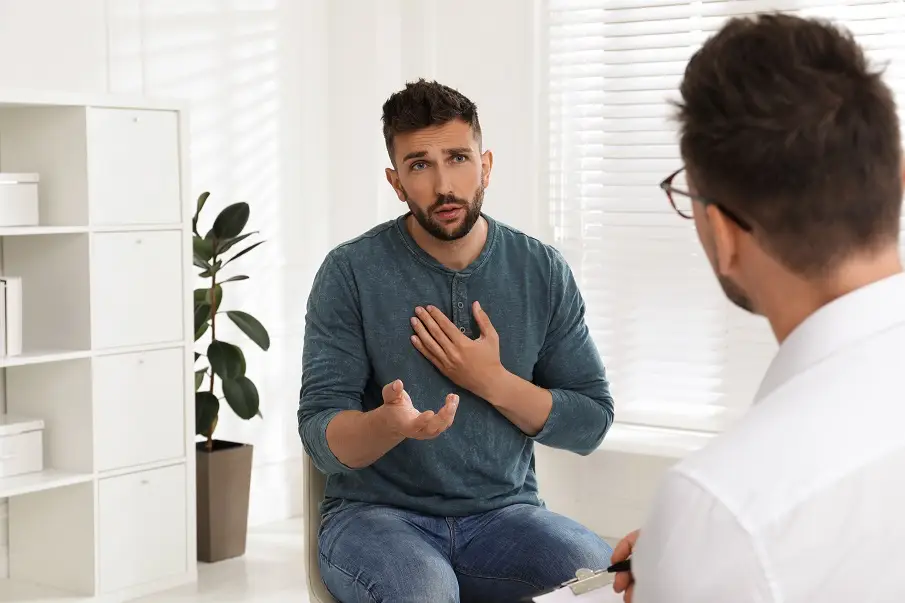
• Why Choose Gay-Friendly Rehab?
When you’re struggling with addiction, it’s important to feel comfortable and safe in your treatment setting. For LGBTQ individuals, this can be difficult to find. Fortunately, our team of experts can help you find an LGBTQ-friendly rehab. Here are some of the benefits of an LGBTQ-friendly rehab:
• Improved Outcomes. Studies have shown that people who receive treatment in a setting that affirms their identity have better outcomes. This is because they feel more comfortable and can focus on their recovery rather than feeling like they have to hide their true selves.
• Safety. Unfortunately, not all treatment settings are safe for LGBTQ individuals. In an LGBTQ-friendly rehab, you will be surrounded by people who understand and accept you for who you are. This can make all the difference in your recovery journey.
• Tailored Care. LGBTQ-friendly rehabs offer tailored care that considers the unique experiences and needs of LGBTQ individuals. This can make a big difference in your overall experience in treatment and your likelihood of success in recovery.
• Can same-sex partner sleep in the same room?
There are many important factors to consider when choosing an addiction rehab facility, and one is whether you will have your own space. For couples, this can be a particularly delicate issue. On one hand, you might feel more comfortable sharing a room with your partner; on the other hand, you might feel like you need your own space to focus on your recovery.
Many rehabs that allow same-sex couples do not allow same-sex partners to share a room. Addiction recovery is a very personal process. To truly recover from addiction, individuals need to be able to focus on themselves and their own healing. Having a romantic partner in the room can be a distraction from this vital work.
While there are some drawbacks to not being able to share a room with your same-sex partner during treatment, it is essential to remember that the ultimate goal is to get you healthy and sober.
So, what’s the correct answer?
There is no one-size-fits-all answer to this question. It depends on the individual needs of each couple and the facility you attend. Some couples might find that sharing a room helps them feel more connected and supported during treatment; others might find that it’s too distracting and takes away from their ability to focus on recovery. Ultimately, the decision of whether or not to share a room during treatment will depend on which facility you choose.
Private Rehab For Gay Couples
Conclusion:
While there are many high-quality rehab centers that cater to the needs of all individuals struggling with addiction, there are also rehab centers specifically focused on helping those in the LGBTQ community. These facilities offer a safe and welcoming environment for LGBTQ+ individuals and couples alike. They are staffed by counselors and other professionals familiar with the unique challenges faced by the LGBTQ community.
Some same-sex couples may feel more comfortable in an exclusively LGBTQ+ facility, while others may prefer a traditional rehab facility without this specialty. There is no “right” answer when it comes to choosing a rehab center; ultimately, the decision should be based on what you and your partner feel most comfortable with.
If you or someone you love is struggling with addiction and are looking for an LGBTQ-friendly rehab, our team can help. We understand the unique challenges that LGBTQ individuals face when seeking treatment, and we can help you find a setting that is safe and affirming. Call us today to learn more about how we can help you on your journey to recovery.
Start Healing Now
…………
We strive to make your addiction treatment experience as comfortable as possible.
